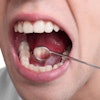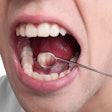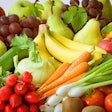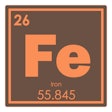Maintaining a vegetarian diet, especially one that includes foods like beans, may benefit oral health by promoting a healthier saliva pH, according to a study recently published in Lifestyle Medicine.
Furthermore, nonvegetarian diets tend to include foods and drinks that may lower salivary pH and increase the risk of tooth enamel erosion, the authors wrote.
“This finding contributes to the growing body of evidence suggesting that dietary patterns may influence oral health parameters,” wrote the authors, led by Princess-Lisa Cofie of Loma Linda University (Lifestyle Med, June 30, 2025, Vol. 6:3, e70030).
The cross-sectional study occurred during a three-day vegetarian health festival in China. A total of 237 adults, including 79 vegetarians and 158 nonvegetarians, volunteered to complete a health questionnaire and measure their saliva pH 30 minutes after eating, they wrote.
The questionnaire gathered demographic data, dietary habits, and information on lifestyle factors. Vegetarians were defined as those following a vegetarian diet for at least three months, while nonvegetarians regularly consumed animal products. Participants fasted for at least 30 minutes before pH testing, and saliva pH levels were classified from highly acidic (below 6) to alkaline (above 7.5).
The average saliva pH for vegetarians was 7.07, falling within the optimal range, while nonvegetarians had a lower mean pH of 6.61, leaning more acidic. This difference may be due to nonvegetarians consuming more sugary drinks and meats high in saturated fat, which are linked to a greater risk of caries.
Beans and vegetables appeared to be the main foods influencing saliva pH, with beans being a key factor in the vegetarian diet. Significant differences in the intake of beans, nuts, and vegetables were observed between the two groups, with vegetable intake nearing statistical significance (p = 0.053).
However, this study had limitations. The study could not confirm if diet alone caused the differences in salivary pH, as other lifestyle factors linked to dietary habits may have played a role, the authors added.
“Healthcare professionals, particularly dental practitioners, should consider advocating for vegetarian diets as part of a comprehensive approach to dental and overall health,” Cofie and colleagues concluded.




















